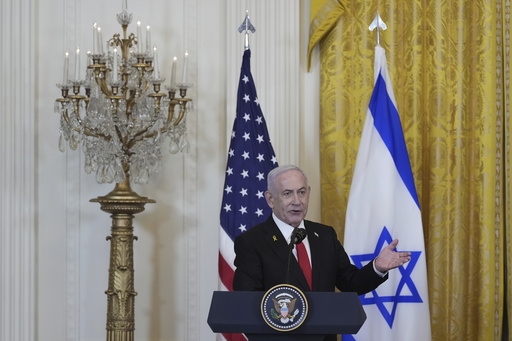WASHINGTON — Israeli Prime Minister Benjamin Netanyahu’s initial engagements during his recent visit to the U.S. focused more on evangelical leaders than on American Jewish groups.
On Monday, Netanyahu convened with a group of conservative Christians at Blair House, located near the White House. This meeting preceded a crucial discussion with President Donald Trump scheduled for Tuesday, which would include significant proposals concerning Gaza’s future.
Pastor Jentezen Franklin, a prominent figure from a Georgia megachurch and a spiritual adviser to Trump, expressed that the timing of their meeting signifies the robust and historical bond between Israel and American Christians.
The gathering featured notable attendees such as former Arkansas Governor Mike Huckabee, a Baptist pastor slated for a U.S. ambassadorship to Israel, and Tony Perkins, the president of the Family Research Council, a key player in social conservatism.
Many participants identified as Christian Zionists, including Pastor John Hagee, who founded Christians United for Israel, a prominent evangelical organization boasting a claimed membership of 10 million. Hagee remarked that Netanyahu’s visit comes at a pivotal moment as Israel aims to mend the U.S.-Israel relationship after a period perceived as lacking robust support for Israel.
Christian Zionism, primarily among American evangelicals, embraces a biblical interpretation asserting that the land of Israel is divinely promised to the Jewish people. Proponents often believe that such support for Israel will attract God’s blessings, and some interpret scripture as suggesting a future conversion of many Jews to Christianity.
This meeting highlighted the significant backing that evangelical Christian Zionists provide to Israel, particularly as Trump embarks on his second term. Their support coincides with contentious remarks from Republicans and Trump regarding Gaza and the West Bank.
In a surprising press conference with Netanyahu, Trump proposed the notion of relocating Palestinians from Gaza and suggested U.S. oversight of the conflict-ridden area. Drawing from his background in real estate, Trump envisioned a vibrant Gaza akin to “the Riviera of the Middle East,” asserting that it could become a valuable and prosperous locale, potentially allowing residents to live peacefully.
Jared Kushner, Trump’s senior adviser, complimented the potential of Gaza’s real estate and previously suggested efforts to clear the area before revitalizing it.
Responses from different community leaders varied widely. Nihad Awad, leading the Council on American-Islamic Relations, condemned Trump’s plan, insisting that Gaza rightfully belongs to Palestinians, and deeming any displacement proposals entirely unacceptable.
Awad argued that to establish enduring peace, Trump must first recognize the necessity of ending Israeli governance and suppression of the Palestinian people. Salam Al-Marayati from the Muslim Public Affairs Council highlighted the problematic colonial implications of Trump’s suggestions, predicting that forced relocations would likely lead to escalated violence and heightened anti-American sentiments.
Among Jewish organizations, opinions diverged as well. Rabbi Rick Jacobs, representing the progressive Union for Reform Judaism, expressed skepticism about Trump’s comments, asserting that peace requires negotiations rather than forced relocations. Conversely, Rabbi Moshe Hauer from the Orthodox Union acknowledged the insanity of past strategies concerning Gaza while cautiously entertaining the idea that Trump’s controversial proposals might be worth serious consideration.
Sam Markstein from the Republican Jewish Coalition praised Trump’s narrative, framing the president as a disruptor ready to challenge outdated policies in pursuit of stability and prosperity for the region.
Furthermore, a pro-Christian Zionist initiative gathered momentum when Senator Tom Cotton reintroduced legislation urging the use of “Judea and Samaria” in all official U.S. documents instead of “West Bank.” This term is commonly used by Israel and reflects a deep historical connection to the Jewish people.
Israel seized control of the West Bank, along with the Gaza Strip and East Jerusalem, during the 1967 conflict, territory that Palestinians aspire to claim for their future state. Despite wide international support for a Palestinian state based on pre-1967 borders, American Christian Zionists frequently advocate the use of biblical terminology to signify their allegiance to Israeli claims over these regions. This rallying cry often receives enthusiastic responses at Christian United for Israel conferences.
Huckabee and others often note that historical claims rest in biblical texts that they argue grant Israel ownership over these disputed lands. Interestingly, parts of Judea and Samaria were significant territories in ancient Israel’s history, representing distinct kingdoms during a period of royal governance.



